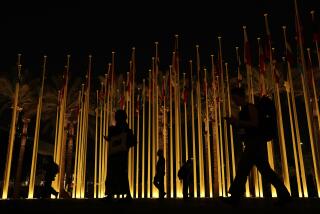Helsinki Talks End; Allied Schism Played Down
- Share via
BERN, Switzerland — Six weeks of talks on improving East-West contacts ended Tuesday with the United States defending its veto of a compromise final document and with other Western delegates seeking to minimize the split the U.S. action has opened in the North Atlantic Treaty Organization.
The proposed compromise, drafted by neutral and nonaligned countries in the hope of breaking a deadlock, dealt with reunifying divided families and with improving conditions for other personal contacts. The Soviet Union, the other East Bloc countries and all the NATO countries with the exception of the United States had indicated a willingness to approve it.
But on Monday, Michael Novak, the chief U.S. delegate, rejected it. He told the final plenary meeting of the 35 countries--signatories to the 1975 Helsinki accords on human rights--that the proposed final document contained loopholes and was potentially dangerous.
“My government takes words seriously,” Novak said Tuesday, adding that “there is unease in our country about the growing gap between words and compliance.” He said that if the document had been accepted, people could have been hurt because it contained language that could be distorted by cynical governments.
No Support on Veto
Of the delegates here from other NATO countries, none supported the U.S. veto but all expressed at least a measure of understanding.
Ambassador Hans Meesman of the Netherlands said: “We were prepared to accept the outcome of our deliberations. But as we share some of the hesitations of those who felt it was inadequate, we have understanding for the inability of one of our friends and allies to join the consensus.”
Yuri B. Kashlev, the chief Soviet delegate, criticized the U.S. rejection as having “threatened us with a clenched fist.”
He said that the United States, by refusing to approve the proposals, “did not even allow us to make a small step forward for the ordinary people on whom they have been lecturing us so often.”
Still, Kashlev went on, times are changing, and the fact that other countries unanimously supported the proposals “cannot but inspire us with optimism about the Helsinki process.”
The “Helsinki process” is the term applied to the effort to improve East-West contacts in keeping with the 1975 Helsinki accords. The 35 countries that signed the accords have since met regularly, on this occasion at Bern.
(In Washington, State Department spokesman Charles Redman said that Soviet negotiators in Bern told their U.S. counterparts Tuesday that 117 Soviet citizens from divided families will be allowed to emigrate to the United States. Such a release would resolve 36 of 126 cases on the U.S. list of divided families.)
Veto ‘Incomprehensible’
Rolf Torovsky of Austria, chief coordinator of the neutral group that helped draft the compromise, said he regrets the U.S. move, which he described as incomprehensible.
British delegate Anthony Williams said his country would have accepted the compromise but it could understand the American hesitation.
“In our eyes,” he said, “the real problem is not the United States or its scruples. The problem is that, only too clearly, some countries in Eastern Europe continue to be so reluctant to turn their professions and commitments regarding humanitarian matters into anything worthwhile in the real world. Words without action make a mockery of human tragedy.”
Polish delegate Jerzy Nowak spoke of “shattered hopes of taking at least a half-step if a full one was not possible.”
Without mentioning the United States, he went on: “European public opinion will be able to judge who made this improvement impossible. Were they those who wanted to build on the Helsinki Final Act, or those who tried to dazzle public opinion with the image of an elaborate top-heavy roof without any regard to its underpinnings?”
Despite the controversy over the American veto, Western delegates almost across the board said that the meeting was the most open, direct and uninhibited discussion of human contacts in the 11 years since the Helsinki accords were signed.
More to Read
Sign up for Essential California
The most important California stories and recommendations in your inbox every morning.
You may occasionally receive promotional content from the Los Angeles Times.













